Truthdiggers of the Week: NYC Marathon Protesters
Even the world’s largest marathon was no match for the chorus of objections that erupted after it was revealed the race would go on despite the continued storm rescue and recovery efforts.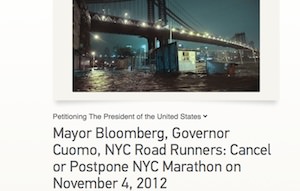
Mayor Michael Bloomberg had insisted the New York City Marathon would proceed as scheduled Sunday even as the city’s five boroughs were experiencing rampant flooding, power outages and mass transit shutdowns in the aftermath of Hurricane Sandy. As late as Friday afternoon, organizers were still planning to go ahead with the race.
But even the world’s largest marathon was no match for the chorus of protests that erupted after it was revealed the event would be held despite the continued rescue and recovery efforts. Officials would eventually be forced to relent and make the correct decision. The race was off.
There were lots of reasons to cancel the event in the wake of the deadly superstorm. Critics pointed to the fact that many in the storm-ravaged areas were without electricity, while thousands lacked clean water. Moreover, there was the issue of diverting resources from areas that desperately needed them for recovery efforts.
As The Daily Beast’s Megan McArdle noted:
Generators that could be powering devastated houses are going to be used to power tents for race officials and the media. New Yorkers who need a place to stay will be turfed out of scarce hotel rooms in order to make room for runners, reporters, and tourists come to watch the race. Trucks that could be delivering relief supplies to Staten Island are instead currently being used to set up crowd barriers; there will also, of course, be police and ambulance service diverted to manning the race route.
Only one bridge connects Staten Island, the starting point of the marathon, to the rest of the city. Presumably that bridge would have had to have been at least partially shut down because of the race, something that would have hampered repairs in the devastated community.
Wrote McArdle:
Given the disruption the area has experienced, this seems frankly insane. “If they take one first responder from Staten Island to cover this marathon, I will scream,” tweeted Councilman James Oddo said on his Twitter account, and it’s hard to blame him.
What started initially as complaints from area residents turned into a full-fledged campaign that included elected officials, race participants and others, complete with social media campaigns on platforms such as Twitter, Facebook and Tumblr, where protesters could voice their opposition to the marathon.
An online peition on Change.org garnered thousands of signatures to have the race called off.
The petition said, in part:
People have lost their children from their arms while fleeing the surges, houses have collapsed, businesses have been destroyed, and loved ones have perished. People don’t have shoes to walk the streets, clothes on their backs, gas to get around, or even food. Homes are still underwater. Power isn’t even close to being restored and looters have begun to hit the streets. There are homes still to be searched, missing people to be found, hungry people to be feed, children to clothe and families to shelter.
…To have this race continue as scheduled is disrespectful to the residence of NYC. New York is devastated; we need cops to protect us and all NYC resources to go toward the search, rescue and restoration of our communities. We understand that people have trained for years to run this marathon; however, people have spent their entire lives building what mother-nature took away in a heartbeat. Given that all things being equal, we think the lives of New Yorkers should come first. Seeing the aftermath of this storm, putting business before the basic needs of NYC residence is both insensitive and irrational. You can postpone a marathon, but you cannot postpone searching for people, feeding people or protecting people.
More than 7,000 people signed it.
As the backlash grew, officials bowed to the pressure and called off the marathon, a first in the event’s illustrious history.
“We would not want a cloud to hang over the race or its participants, and so we have decided to cancel it,” Bloomberg said in a statement. “We cannot allow a controversy over an athletic event — even one as meaningful as this — to distract attention away from all the critically important work that is being done to recover from the storm and get our city back on track.”
The marathon brings in hundreds of millions of dollars for the city, a lucrative incentive for officials to proceed with the event.
Were it not for the chorus of voices protesting the race, it might have run as scheduled, no doubt impacting a city still in recovery.
For their efforts, we honor as our Truthdiggers of the Week those whose public and persistent outcry led to the marathon being canceled this year.
Your support matters…Independent journalism is under threat and overshadowed by heavily funded mainstream media.
You can help level the playing field. Become a member.
Your tax-deductible contribution keeps us digging beneath the headlines to give you thought-provoking, investigative reporting and analysis that unearths what's really happening- without compromise.
Give today to support our courageous, independent journalists.


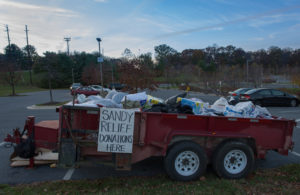
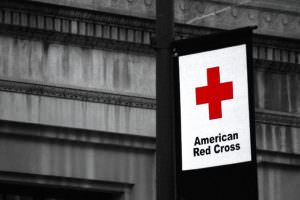
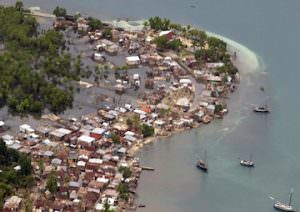
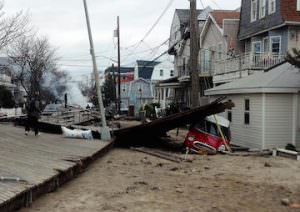
You need to be a supporter to comment.
There are currently no responses to this article.
Be the first to respond.